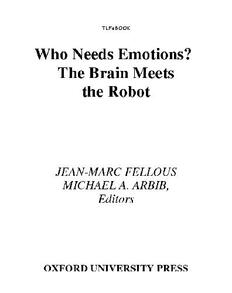Download Who Needs Emotions The Brain Meets the Robot PDF Free - Full Version
Download Who Needs Emotions The Brain Meets the Robot by Fellous & Arbib in PDF format completely FREE. No registration required, no payment needed. Get instant access to this valuable resource on PDFdrive.to!
About Who Needs Emotions The Brain Meets the Robot
The idea that some day robots may have emotions has captured the imagination of many and has been dramatized by robots and androids in such famous movies as 2001 Space Odyssey's HAL or Star Trek's Data. By contrast, the editors of this book have assembled a panel of experts in neuroscience and artificial intelligence who have dared to tackle the issue of whether robots can have emotions from a purely scientific point of view. The study of the brain now usefully informs study of the social, communicative, adaptive, regulatory, and experimental aspects of emotion and offers support for the idea that we exploit our own psychological responses in order to feel others' emotions. The contributors show the many ways in which the brain can be analyzed to shed light on emotions. Fear, reward, and punishment provide structuring concepts for a number of investigations. Neurochemistry reveals the ways in which different "neuromodulators" such as serotonin, dopamine, and opioids can affect the emotional valence of the brain. And studies of different regions such as the amygdala and orbitofrontal cortex provide a view of the brain as a network of interacting subsystems. Related studies in artificial intelligence and robotics are discussed and new multi-level architectures are proposed that make it possible for emotions to be implemented. It is now an accepted task in robotics to build robots that perceive human expressions of emotion and can "express" simulated emotions to ease interactions with humans. Looking towards future innovations, some scientists posit roles for emotion with our fellow humans. All of these issues are covered in this timely and stimulating book which is written for researchers and graduated students in neuroscience, cognitive science, psychology, robotics, and artificial intelligence.
Detailed Information
| Author: | Fellous & Arbib |
|---|---|
| Publication Year: | 2005 |
| Pages: | 416 |
| Language: | English |
| File Size: | 6.594 |
| Format: | |
| Price: | FREE |
Safe & Secure Download - No registration required
Why Choose PDFdrive for Your Free Who Needs Emotions The Brain Meets the Robot Download?
- 100% Free: No hidden fees or subscriptions required for one book every day.
- No Registration: Immediate access is available without creating accounts for one book every day.
- Safe and Secure: Clean downloads without malware or viruses
- Multiple Formats: PDF, MOBI, Mpub,... optimized for all devices
- Educational Resource: Supporting knowledge sharing and learning
Frequently Asked Questions
Is it really free to download Who Needs Emotions The Brain Meets the Robot PDF?
Yes, on https://PDFdrive.to you can download Who Needs Emotions The Brain Meets the Robot by Fellous & Arbib completely free. We don't require any payment, subscription, or registration to access this PDF file. For 3 books every day.
How can I read Who Needs Emotions The Brain Meets the Robot on my mobile device?
After downloading Who Needs Emotions The Brain Meets the Robot PDF, you can open it with any PDF reader app on your phone or tablet. We recommend using Adobe Acrobat Reader, Apple Books, or Google Play Books for the best reading experience.
Is this the full version of Who Needs Emotions The Brain Meets the Robot?
Yes, this is the complete PDF version of Who Needs Emotions The Brain Meets the Robot by Fellous & Arbib. You will be able to read the entire content as in the printed version without missing any pages.
Is it legal to download Who Needs Emotions The Brain Meets the Robot PDF for free?
https://PDFdrive.to provides links to free educational resources available online. We do not store any files on our servers. Please be aware of copyright laws in your country before downloading.
The materials shared are intended for research, educational, and personal use in accordance with fair use principles.

